The Lehman Trilogy
Stefano Massini
Adapted by Ben Power
American Conservatory Theater

It is a story whose ending we already too well know. The world’s fourth largest investment bank files for the biggest bankruptcy in American history, sending Wall Street into panic and initiating the 2008-09 global financial crisis and the collapse of numerous, other banking institutions. Ben Power’s three-hour, three-act The Lehman Trilogy – a 2022, five Tonys-winning adaptation of Stefano Massini’s original, five-hour, French version – opens in a scene among stacked, filing boxes soon to be removed by departing employees in the New York headquarters of Lehman Brothers. The time is just moments before the announcement of the firm’s Chapter 11 filing on September 15, 2008.
Truly epic in scope and length, The Lehman Trilogy immediately rewinds the clock 164 years to the moment the first Lehman brother lands off the boat in New York. What follows in this National Theatre and Neal Street Productions touring visit to the American Conservatory Theatre is a live, cinematic-like history lesson that is immensely captivating, fascinating, and eye-opening as the incredibly successful pursuit of the American Dream by three immigrant brothers eventually becomes a frightening nightmare affecting the entire world.
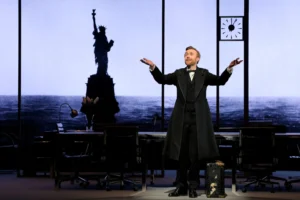
Powerfully and creatively conceived and directed by Sam Mendes, The Lehman Brothers’ opening scene in the plush, high-rise office with windows overlooking the New York skyline remains the setting for the entire history about to unfold in its incredible detail. As the first, Bavarian-born brother – Heyum soon to be renamed Henry at immigration – arrives in 1844, he says repeatedly the Jewish blessing “Baruch hashem” (“Blessed be G-d”) and remarks, “I am in the magical, music box called America.”
Set Designer Es Devlin takes that notion and creates a raised, rotating, glass-boxed, office setting with a huge projection screen engulfing the set where videos designed by Luke Halls will add scenic, historic, dream, and nightmare context throughout the stories to come. The music box twirls in light-shifting, light-surprising magnificence (designed by Jon Clark) as the world constantly changes through the Lehman generations, with the mostly black-and-white scenic design becoming like a yesteryear movie complete with the piano music played by Rebekah Bruce. With watchful eyes, the pianist perfectly times her tunes, chords, and sometimes chaotic poundings from her upright instrument positioned on the floor in front of the theater’s stage. The music (composed by Nick Powell) becomes an integral part of the story, providing an underlying thread of emotions, anticipations, wired nerves, and all-encompassing disruptions.
While the years and decades of history-filled events pass in the modern setting of the story’s tragic ending, the characters themselves – three arriving brothers – remain dressed in their German long coats and suits (Katrina Lindsay, designer) even as the clock ticks the parts of three centuries and as they each take on multiple parts. In this must-see production that often seems like we are watching a live reimagination of an on-line, audiobook about the Lehman threesome and their future generations, their humble beginnings and their overly slick and lush ending are always in our focus.
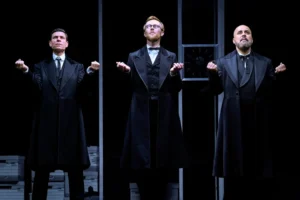
Act One, “Three Brothers,” introduces us to Henry (John Heffernan), Emanuel (Howard W. Overshown), and Mayer (Aaron Krohn) — all sons of a cattle merchant in Bavaria – as they arrive in that order to the U.S. over a six-year period and settle in Montgomery, Alabama. As did many Jewish immigrants in the South, the brothers open a dry-goods store selling fabrics, with Henry telling us that in Alabama, “you live to work” – a belief that will be the commanding motto of these three and all future Lehmans.
When a fire destroys most of Montgomery and the surrounding cotton plantations, the Lehmans decide to provide credit to the farmers to restart their destroyed crops, providing them upfront cash with the promise of one-third their eventual crop as payment. And with that, the Lehman Brothers invent the profession of the “middleman” – a position the family will continue to have to link producers and buyers of first cotton, then coffee, trains, tobacco, armaments, films, radio, TV, and more.
Wordy is the script that reveals the Lehmans’ business and personal lives events, decisions, and ongoing, major turns of events; but that wordiness is never too overbearing or tedious. The brothers narrate in detail their surroundings; their reactions to each other; their descriptions of others inside and outside the family; and their inner most feelings, hopes, and fears. In many ways, we are listening to them read their own autobiographies while seeing short vignettes played out to fill in details of what we are hearing. And as their stories unfold, we cannot help but lean in so not to miss one iota of another most interesting detail.
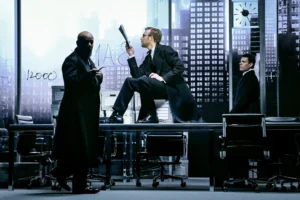
Brotherly kidding, rivalry, and deep-felt devotion is evident among the three siblings: oldest and dominant Henry known as “Head;” the middle and rough-housing Emanuel, called “Arm;” and the youngest Mayer, lovingly nicknamed “kush, kush,” Yiddish for “kiss,” denoting his role as a mediating go-between when his two elder brothers disagree – which is more often than not. Each depicting actor excels both in developing a distinctive impression and personality not only for each of the brothers but also for members of the next generation.
In Act Two’s “Fathers and Sons,” John Heffernan becomes Emanuel’s son fast-talking, highly entrepreneurial Philip; Howard W. Overshown, Mayer’s son and future
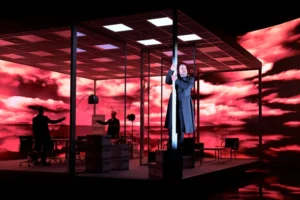
New York governor, Herbert; and Aaron Krohn, Philip’s son Robert, the last of the Lehmans to serve as Chair of the firm. Each actor also morphs in the twist of a second into family patriarchs; bawling babies; playful kids; chanting rabbis; skeptical farmers; demanding business partners; and flirting, coquettish, future wives. With a myriad of voice, posture, accent, facial expression switches made instantaneously but while still in their mid-nineteenth centuries suits, each of the actors convincingly – and often laugh-out-loud humorously – becomes the story’s many people three-to-ninety in years. Each actor also has a chance to wow us as he reenacts sleep-depriving dreams that rival ones that the biblical Jacob and Joseph have – dreams that are accompanied by sudden bursts of blinding colors, fast-approaching mountains of clouds, or fast-rising floors of a freakish skyscraper via the production’s eye-popping videography.
And throughout the years, the family’s Jewish heritage and religious practices are a constant thread linking the generations – even as those beliefs themselves are updated to further assimilate the family into the American culture they so love and where they thrive.
The excitement of railroads linking the country’s coasts, the horror and devastation of the Civil War, the optimism of a century’s turning, the upheavals of World Wars, and the life-and-economy-changing inventions from automobiles and planes to television and computers are all vivid and important parts of the Lehman history that plays out in both the changing names of their firm and in the fortunes the family builds. Even the darkest events like fires, wars, and a stock market’s crash become opportunities for a family that has learned how to “use money to make more money.”
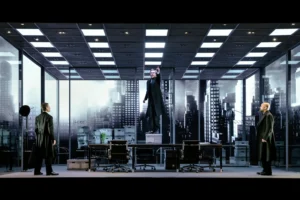 Act Three, ironically entitled “The Immortals,” begins with the aftermath of Black Thursday and then pick up the pace, finally to become totally frenetic as an aging Robert (Bobby) Lehman and his unseen directors around the massive firm’s conference table increasingly “buy” in order “to survive, to exist, to live.” Like a near maniac, Bobby outlines a vision for their investment banking empire where “everyone borrows, everyone buys” and “we will become all powerful.” As he stacks cardboard, filing boxes higher and higher while barely balancing himself from falling, the eventual crash of millions of derivatives becoming ever-more toxic is now inevitable to us, if not yet to him and all those around him.
Act Three, ironically entitled “The Immortals,” begins with the aftermath of Black Thursday and then pick up the pace, finally to become totally frenetic as an aging Robert (Bobby) Lehman and his unseen directors around the massive firm’s conference table increasingly “buy” in order “to survive, to exist, to live.” Like a near maniac, Bobby outlines a vision for their investment banking empire where “everyone borrows, everyone buys” and “we will become all powerful.” As he stacks cardboard, filing boxes higher and higher while barely balancing himself from falling, the eventual crash of millions of derivatives becoming ever-more toxic is now inevitable to us, if not yet to him and all those around him.
In the end, whether we as audience find ourselves admiring or decrying the incredible business acumen, the sheer audacity, and the personal power to move financial mountains that the Lehman brothers instilled in themselves and their sons and nephews, we cannot help but admit that The Lehman Trilogy is a theatrical masterpiece in much the same way Oppenheimer recently became almost immediately a film for all times. Each tells the mostly true story of near-unbelievable accomplishments that have a controversial and devastating outcome; but each is also a history so important to know. Perhaps more than any recent offering on a Bay Area stage, American Conservatory Theatre’s hosting of the touring The Lehman Trilogy is theatrical magic at its height and is definitely a riveting must-see before its June 23 close.
Rating: 5 E, MUST-SEE
A Theatre Eddys Best Bet Production
The Lehman Trilogy continues through June 23, 2024, in a National Theatre and Neal Street Productions touring, three-hour (plus two intermission) production at American Conservatory Theatre in the Toni Rembe Theater, 415 Geary Street, San Francisco. Tickets are available online at https://www.act-sf.org/, by calling the box office at 415-749-2228, or by email at tickets @act-sf.org.
Photo Credits: Kevin Berne

Leave a Reply